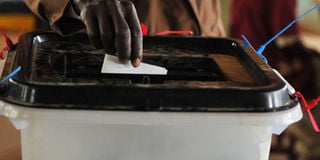New poll law seeks to curb vote buying

Photo/FILE
A Kenyan voter puts his vote in a ballot box at a polling station on August 4, 2010 during the referendum. Politicians have been using all manner of corruption including buying votes to influence the outcome of the election in their favour.
Campaign spending will be limited by new election laws in a move aimed at levelling the political playing field.
Candidates who break the financial and other rules will face stiff penalties.
This is among a raft of radical changes that have been introduced in the just published Independent Electoral and Boundaries Commission Act.
Kenya last had a cap on election spending in the ‘80s, which was then set at Sh40,000 for parliamentary seats. However, the limit was removed with the advent of pluralism.
Politicians have since been using all manner of corruption including buying votes to influence the outcome of the election in their favour.
The new Act also seeks to ensure that the new organ supervising elections has both financial and legal muscle to punish those who flout the rules.
The provisions in the Act, which sets up the commission to supervise the elections, were apparently crafted to ensure that electoral malpractices of the past — some of which triggered the 2008 post-election violence — do not recur.
The Act seeks to cushion the IEBC from the financial woes that dogged previous commissions by setting up an IEBC fund from which they will draw their salaries, allowances and other benefits.
The fund will be under the control of the IEBC secretary.
Powers to limit amounts
The commission has been given powers to limit the amounts that candidates or political parties can spend in an election campaign.
The Act, in Section 4 (i), says the IEBC will be responsible for “the regulation of the amount of money that may be spent by or on behalf of a candidate or party in respect of any election.”
This will require parties and candidates to declare the funds they have raised for their campaigns with a clear monitoring system to report those who will flout the law.
The IEBC will set a strict code of conduct and rules, which candidates for all political positions and parties will be required to uphold
In particular, the electoral and boundaries commission will monitor the nomination of candidates by political parties with a view to lock out those who will act outside the law.
In a departure from the past where election officials looked up to the police to prosecute law breakers, the Act gives the IEBC the mandate of investigating any malpractices and punishing the culprits.
“The Commission is responsible for the investigation and prosecution of all electoral offences by candidates, political parties or their agents,” the Act says in Section 4(l).
The IEBC will also regulate the way political parties nominate their candidates to ensure that no short-cuts are used by party leaders to give their favourite aspirants party tickets.
Previous electoral commissions only took part in the nominations on invitation by parties and could not tell if the process was fair and democratic.
This could have been drawn with the knowledge that parties will nominate more candidates than in the past elections.
In the next elections, they will nominate candidates for the positions of president, vice- president, MPs, senators, governors and ward representatives.
The IEBC is also mandated to create new electoral units such as constituencies and wards.
The Constitution has set 290 as the number of constituencies while the number of wards could be fixed at 1,625 if a draft Bill on devolution becomes law.
In addition to regular revision of the voters register, the IEBC has the mandate of introducing new technology in the registration of voters and tallying of votes.
Their predecessor — the Interim Independent Electoral Commission— has already pioneered electronic voter registration in selected constituencies.
The Act also sets up a leaner nine-member IEBC with the chairperson and the deputy as the only full-time commissioners.
However, they will not have executive powers, which have been vested in the secretary to the commission.
The other seven commissioners will serve on part-time basis. The commissioners will serve for a single term of six years.
The members will be shortlisted by a panel made up of two representatives from the Office of the President and two from the PM’s office.
The Judicial Service Commission, Kenya Anti-Corruption Advisory Board and the Association of Professional Societies of East Africa will each be represented by one person.




